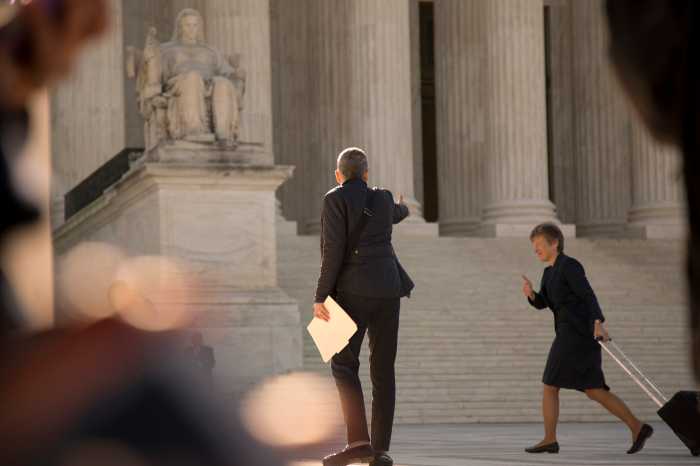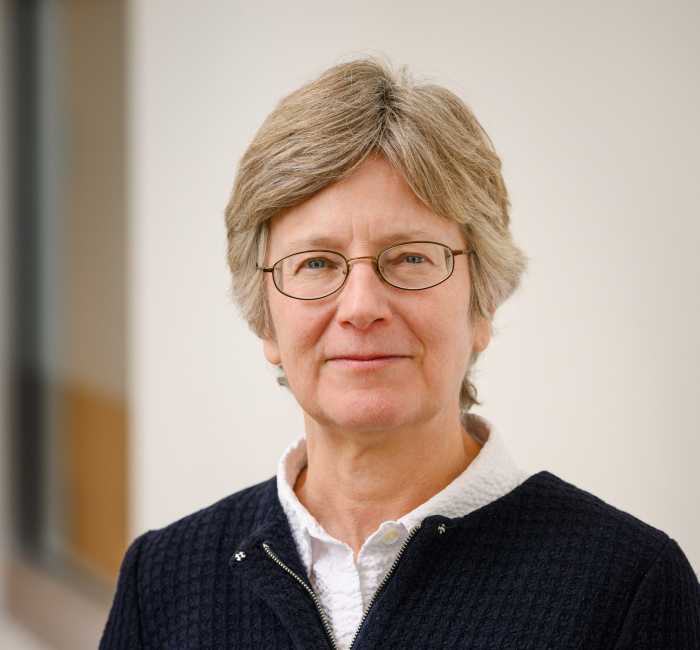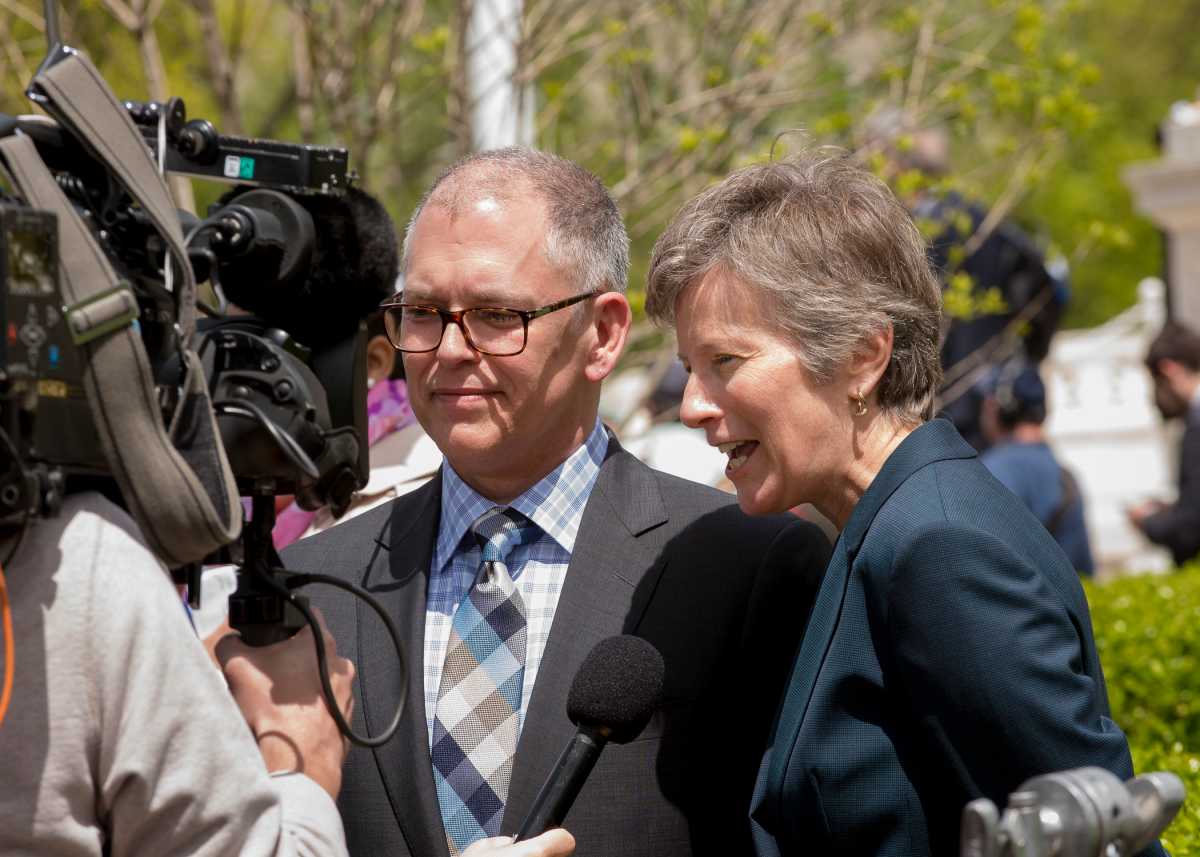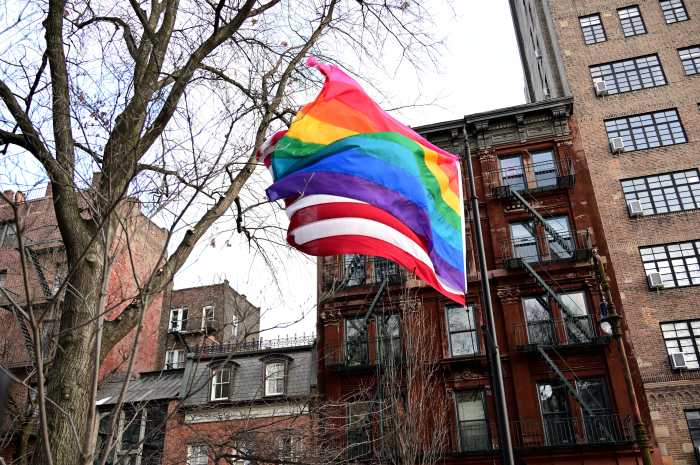One decade ago, out attorney Mary Bonauto was in the thick of the fight for marriage equality, aggressively advocating for marriage rights in one state after another.
Those many battles culminated in a critical boiling point in 2015: Bonauto traveled to Washington on June 26 of that year in anticipation of a looming Supreme Court decision on marriage equality, though she was never certain when the justices would hand down the ruling. On this day, Bonauto — one of the attorneys who argued before the court in the successful Obergefell v. Hodges case — sat in the courtroom and noticed water glasses in front of Justice Anthony Kennedy’s seat. That was a hint that it could be a fateful day ahead.
Bonauto, who has been an attorney with GLBTQ Legal Advocates & Defenders (GLAD Law) since 1990 and serves as senior director of Civil Rights and Legal Strategies, was right about the water. On that day, the Supreme Court did, indeed, rule in favor of marriage equality nationwide — a transformational moment in American history — but rather than burst into celebration, Bonauto needed to make sure the coast was clear.
“I ran back to the hotel to just see what was happening nationally,” Bonauto, a native of Newburgh, New York, said in an interview with Gay City News. Bonauto said she wanted “to support people through any problems,” but after checking, she realized something: “There weren’t any problems.”
“It had been a long time coming,” Bonauto said. “It’s hard to describe, but I was just so relieved and also obviously euphoric. I knew how much this would mean to people all across this country.”

A decade later, no concrete threats to marriage equality have materialized in the United States, but unease about the long-term stability of Obergefell v. Hodges is undeniably growing. This is driven by a host of factors, including the conservative makeup of the Supreme Court, the overturning of Roe v. Wade, and comments by Justices Clarence Thomas and Samuel Alito questioning Obergefell v. Hodges.
Those fears helped prompt Congress to pass the bipartisan Respect for Marriage Act in 2022, which stipulated that states must respect marriages even if Obergefell is overturned. Still, if Obergefell were overturned, dozens of states would ban same-sex marriage licenses, creating new disruptions and unforeseen complications.
Overturning Obergefell, as unlikely as it seems, is a key goal of former Rowan County Clerk Kim Davis of Kentucky, who was famously jailed after refusing to issue marriage licenses to same-sex couples and directing her staff to do the same. Despite several court defeats, Davis’ attorneys recently filed a petition with the Supreme Court seeking the overturning of Obergefell v. Hodges and claiming a First Amendment right to avoid fines she owes for emotional damages and fees.
“I wasn’t surprised [by the petition] and I don’t think it was the last petition either,” Bonauto said.
The Supreme Court is expected to decide this fall whether to hear the case, though many legal experts remain deeply skeptical that it will ultimately do so.
Bonauto, while making it clear she is “not in the business of predicting,” stressed that Davis has a right to file a petition and that every petition should be taken seriously. But she put the petition into context by pointing out that thousands of petitions are filed each year, making Davis’ just one of many under consideration by the Supreme Court.
In August, Bonauto and former Freedom to Marry Marc Solomon jointly authored an opinion piece in USA Today describing Davis’ petition as “especially weak,” adding that “the issues that Davis claims need resolution are narrow and already well settled” and that “it would be highly unusual for the Supreme Court to grant review.”

Even if the case is granted, Bonauto envisions LGBTQ and legal organizations mobilizing into action to safeguard marriage equality. But we aren’t there yet — and we may never get there.
“We have strong things to work with here,” Bonauto said. “Obergefell has been easy to implement. It has been positive for couples. It has not resulted in litigation. And it’s widely supported across demographics, including Republicans.”
Notably, Bonauto’s perspective on the stability of marriage equality is informed in part by the vote breakdown when lawmakers took up the Respect for Marriage Act, which was signed into law by President Joe Biden shortly after it cleared both houses of Congress. The bill secured a filibuster-proof majority of votes in the Senate and more than three dozen GOP votes in the House of Representatives, which Bonauto said “sort of shows how much” people have come around to realizing the benefits of same-sex marriage. Even lawmakers who didn’t necessarily embrace marriage equality still had respect for it.
“The whole point of the Respect for Marriage Act was to preserve the status quo, so as far as Congress was able to on its own ability, that means they were talking about respecting marriages and not disrespecting them,” she said.
Bonauto’s fingerprints were all over many of the relevant cases in the years leading up to Obergefell v. Hodges, particularly in the New England region, including Connecticut, Maine, and Massachusetts, along with Vermont, where she successfully secured the nation’s first civil union law. Bonauto’s record of advocacy for LGBTQ rights in the courtroom extends well beyond marriage equality, encompassing cases ranging from anti-LGBTQ discrimination to the rights of trans student-athletes.
Bonauto’s work on marriage equality led President Joe Biden earlier this year to honor her with the Presidential Citizens Medal — the second-highest civilian honor in the United States — alongside fellow marriage equality champion Evan Wolfson, who founded and led the pro-marriage equality organization Freedom to Marry.
“My spouse and my daughter came, and the White House knows how to throw a party,” Bonauto said, recalling the day she was honored. “Everyone receiving the award had a military escort. What can I say, it felt great — better than I thought it was going to feel.”
Bonauto stressed that the medal was earned as part of a broader, long-term, community-wide effort to achieve marriage rights across the nation.
“We didn’t do this with brilliant legal strategy,” Bonauto said. “It took so many people.”



































